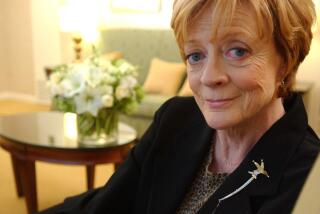‘There is this attitude of accepting life as it is.’
- Share via
Laura Woolley Smith is learning to play the soprano recorder so she can join a newly formed group. She prefers playing piano duets to solos. She plays bridge regularly, but she can’t find time for her stamp collection. She is president of the San Fernando Valley United Nations Assn. , where she works as a volunteer. Smith, 76, lives in Granada Hills.
After the war my husband and I lived in Los Angeles. We decided we’d like to rusticate in the Valley, so we bought an acre of land on Reseda Boulevard and built an adobe house. That was in 1948.
It was a lovely agricultural area, walnut groves, orange groves, some fields. San Fernando Valley was the breadbasket of Los Angeles before the war. A lot of people came after the war, thinking that they would raise families in this atmosphere of openness.
Some of us became a little concerned that there might be tract developments, and we formed a civic association. We descended upon City Hall and the planning commission every once in a while, trying to ask that there be a certain order to the way the Valley was developed.
If they had decided upon managed development, we could have had mass transportation going into the city with areas to park our cars. It could have been built to enhance the quality of life.
It is really strange about how we are short-sighted and not long-sighted. We don’t have the long view. Now we have a real problem.
I was working as a counselor in the placement office at Cal State Northridge when my husband died in 1969. I retired in 1974 when I was 62. I really wasn’t concerned about what I was going to do. I’ve always been a person with many hobbies. I became immediately involved as a volunteer with the United Nations Assn. and its programs. I’m interested in all peoples, and I’m interested in their welfare too. I’m really not a bleeding heart. I just think that it’s practical and rational for everyone to have enough to eat, a house to live in and a job. The world cannot be split into people who have tremendous abundance and other people who have destitution. There has to be a certain amount of equality.
We provide literature and take videotapes to schools and encourage them to develop model United Nations school programs in which students debate issues as they would if they were on the floor of the General Assembly.
I’m a Unitarian over here at the Sepulveda Unitarian-Universalist Society. One Sunday I was there and a man sat beside me, a tall, white-haired man. He said, “Hey, how about brunch at the Odyssey?” And so off we went to the Odyssey and had brunch. And then we remembered earlier days when we were whole families. He had his wife and five children, and I was with my husband and one child. And so we had this real rapport with each other. His name was Bill Evans.
I must confess it was not necessary, as far as I was concerned, to marry, so we became friends, companions. We had a very beautiful time together, going traveling and so forth. We took Spanish together and then traveled to Mexico and studied there about three summers. Went to Cuba, when Cuba was open to United States citizens. We traveled in the People’s Republic of China, went to Spain and went to the U.S.S.R. That was our last trip together, in 1985.
He died in March of this year of Alzheimer’s. And it was quite tragic because he was such a creative sort of person.
These two men who have been in my life have filled my life so that I don’t feel a loss. I actually feel all of the things that we enjoyed together, as still enjoying together.
For long I have been mindful of the fact we come into the world alone, and we must leave alone. This is life. I really don’t know a great deal about the Eastern religions, but from what I’ve been able to snatch, there is this attitude of accepting life as it is. And I think that that has been one of our Westerners’ problems. We were always wanting to change life instead of go with it.


